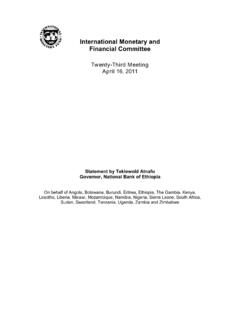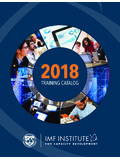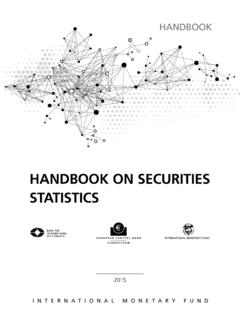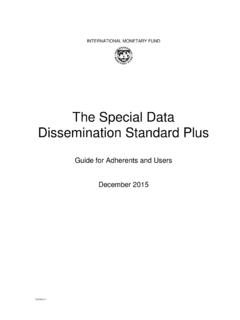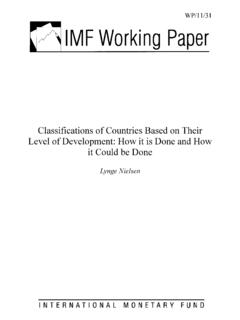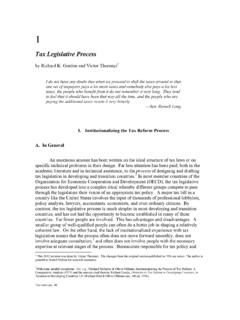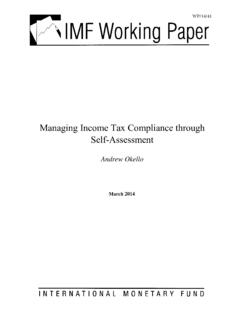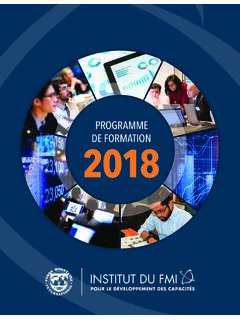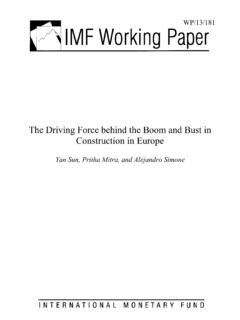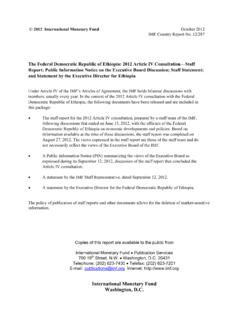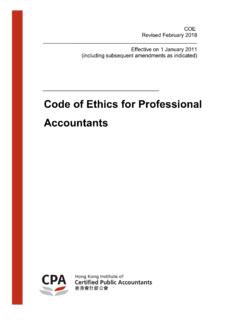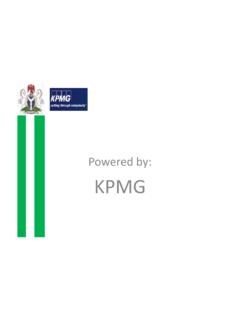Transcription of International Federation of Accountants (IFAC) Public ...
1 1 International Federation of Accountants (IFAC) Public Sector Committee (PSC) Background on PSC Standards Program and Note on Pension Accounting Developments By Paul Sutcliffe and Ahmad Hamidi Ravari (IFAC) August 8, 2003 The views expressed in this paper are those of the authors and not necessarily those of IFAC or the PSC. Readers should refer to the relevant standards for a full understanding of the requirements of IPSASs, IASs and IFRSs referred to in this paper. 1- Government accounting and statistical standards Background: worldwide accounting standard IFAC The International Federation of Accountants (IFAC) is the global organization for the accountancy profession (at ). It represents 155 member organizations in 113 countries. IFAC members represent million Accountants employed in Public practice, industry and commerce, government, and academe. The objective of IFAC is to serve the Public interest and contribute to the strengthening of the International economy by: developing the global accountancy profession; establishing high quality standards in the areas of auditing, education, ethics, and Public sector financial reporting, and advocating transparency and convergence in financial reporting; providing best practice guidance for professional Accountants employed in business; and implementing a membership compliance program.
2 2 The structure and governance of IFAC provide for the representation of its diverse constituencies and interaction with external groups that rely on or influence the work of Accountants . All IFAC online guidance is available free of charge through the IFAC bookstore. International Public Sector Accounting Standards (IPSAS) The Public Sector Committee (PSC) is a standing committee of IFAC. It was established in late 1986 to address, on a coordinated worldwide basis, the needs of those involved in Public sector financial management, reporting, accounting and auditing. The PSC comprises 13 members drawn from IFAC member bodies. PSC members are appointed on the basis of their knowledge of, and experience in, Public sector financial reporting, financial management or audit. PSC members are supported by technical advisors drawn from the accounting profession in their own country. Members of the multilateral lending agencies and certain other regional and International organizations are observers on the PSC with full rights of the floor.
3 The PSC membership for 2003 is currently as follows: Australia (Chair), Argentina, Canada, France, Germany, Hong Kong, Mexico, The Netherlands, New Zealand, Norway, South Africa, UK and USA. The PSC also includes the following observers with full rights of the floor: the Asian Development Bank (ADB), European Commission (EC), International Accounting Standards Board (IASB), International Monetary Fund (IMF), International Organisation of Supreme Audit Institutions (INTOSAI), Organisation for Economic Co-operation and Development (OECD), United Nations (UN), United Nations Development Program (UNDP) and the World Bank. The PSC s current activities are focussed on the development of International Public Sector Accounting Standards (IPSASs) for financial reporting by governments and other Public sector entities. The PSC actioned its Standards Program in late 1996. The Program has been funded by IFAC, the World Bank, the ADB, the UNDP and the IMF.
4 The current status of the PSC s Standards Program is as follows: Twenty accrual basis IPSASs have been published. These IPSASs are based, to the extent appropriate, on International Accounting Standards (IASs) and 3 International Financial Reporting Standards issued by the International Accounting Standards Board (IASB). In many respects, the requirements of these IPSASs reflect the requirements of GFSM2001. However, there are differences. The PSC has initiated a Convergence Working Group, which includes representation from the PSC and IMF to explore opportunities for further convergence of the requirements of IPSASs and the IMF s Government Finance Statistics Manual 2001 (GFSM2001). (For a report on the first meeting of this Group refer to the PSC page of the IFAC website - Background Papers, July 2003 meeting at: ); and a single comprehensive Cash Basis IPSAS Financial Reporting Under The Cash Basis of Accounting was issued in January 2003.
5 The IPSAS is divided into a mandatory and an encouragement section. These standards set out the requirements for financial reporting by governments and other Public sector entities. The PSC has also issued Study 14 Transition to the Accrual Basis of Accounting to provide guidance to assist a government or other Public sector entity in transitioning from the basis of accounting the entity currently adopts (whether cash, modified cash or modified accrual) to the accrual basis. This Study was published in April 2002. It identifies key components that must be addressed in the transition to the accrual basis and notes that the transitional path adopted may differ from jurisdiction to jurisdiction. Steering Committees which include non-PSC members to assist in the development stage of the following key Public sector issues have also been formed: Accounting for Non-Exchange Revenue; and Accounting for Social Policy Obligations. The Steering Committees provide a mechanism for the PSC to broaden its experience and expertise and involve key constituents at an earlier stage of the IPSAS development process.
6 The Steering Committees include members of the accounting profession and others with relevant experience and expertise. 4 The PSC has also commenced work on projects dealing with: Budget Reporting. The first stage of that project is to prepare a research paper which identifies best practice in budget formulation, presentation and reporting; and considers the extent to which budget reporting fits within the PSC s standards setting mandate. The PSC is forming a Steering Committee to provide input on the research paper and make recommendations to the PSC on any matters that might be dealt with by an IPSAS on budget reporting; Accounting for Development Assistance; Impairment of Assets; and Convergence of IPSASs with GFSM2001 and ESA 95 statistical bases. Due Process The PSC adopts a formal due process, which provides all interested parties with the opportunity to contribute to the development process, and to influence the final IPSAS.
7 This process may include the issuance of an Invitation to Comment (ITC) for comment as the first stage of the IPSAS development process and, after considering comments received, the development of an Exposure Draft and a final IPSAS. ITCs and Exposure Drafts of each proposed IPSAS are published and widely distributed free of charge. The exposure period of each proposed IPSAS is usually at least four months, during which time the comments from interested parties are welcomed. Exposure Drafts can be downloaded from the IFAC website at The final IPSASs are also distributed free of charge and can be downloaded from the IFAC website. The PSC holds its meetings in Public and key PSC agenda papers can be viewed on the PSC page of the IFAC web ( ). While interested members of the Public are able to observe PSC meetings, they will not be allowed to participate in the discussion. Steering Committee meetings are not held in Public . International Accounting Standards Board (IASB) The IASB is an independent, privately-funded accounting standard-setter based in London, UK (see: ).
8 It is responsible for the development of 5 International Financial Reporting Standards (IFRSs) for application to the general purpose financial statements of profit-oriented entities. The IASB s objective is to develop, in the Public interest, a single set of high quality, understandable and enforceable global accounting standards that require transparent and comparable information in general purpose financial statements and other financial reporting to help participants in the various capital markets of the world and other users of the information to make economic decisions. In pursuit of this objective, the IASB cooperates with national accounting standard-setters to achieve convergence in accounting standards around the world. The IASB comprises 14 members appointed by the Trustees of the IASC Foundation. The IASC Foundation is funded from the major accounting firms, private financial institutions and industrial companies throughout the world, central and development banks, and other International and professional organisations.
9 Board Members come from nine countries and have a variety of functional backgrounds. The IASB was preceded by International Accounting Standards Committee which issued International Accounting Standards (IASs). IASs continue to be applicable unless and until they are amended or withdrawn by the IASB. Information on the use of IASs/IFRSs around the world is available on the IASB website1. 2 - Pension Accounting in Accounting Standards Pensions provided as consideration for employee services provided IASB Standards International Accounting Standard IAS 19 Employee Benefits deals with a number of benefits provided to employees as a consequence of their employment including employee pensions. For a summary of the requirements of IAS 19, refer to the paper by Ahmad Hamidi-Ravari on the Electronic Discussion Group (EDG) at 1 {0018F11A-6A0E-4FB7-B8CF-93 ADBEF51C5E}&sd=160723710 6 International Public Sector Accounting Standards (IPSASs) The core set of 20 IPSASs for application in the preparation of accrual based financial statements are, where appropriate, based on IASs promulgated by the IASC as at 31 August 1997 or their subsequently revised versions.
10 (31 August 1997 is the date at which the PSC s Standards Program became active.) At that date, 22 IASs had been issued including International Accounting Standards IAS 19 Employee Benefits which deals with employee pensions. In 2002, the PSC considered actioning a project on the development of an IPSAS based on IAS 19. However, IAS 19 was, and is currently, under review by the IASB and may be subject to significant change. Consequently, the PSC has deferred development of a Public sector accounting standard based on IAS 19 until the IASB review is complete and all implications of the review are known. (For a summary of the project see IASB s convergence project summary by Anne McGeachin at ) Therefore, the suite of IPSASs does not currently include a standard which prescribes requirements for financial reporting of pensions provided to government employees as consideration for the services they provide as employees. However, IPSASs do specify a hierarchy of guidance that preparers may refer to in developing their own accounting policies on financial reporting issues for which a specific IPSAS has not been issued.
